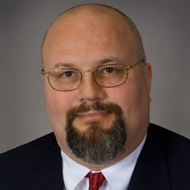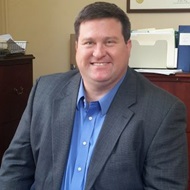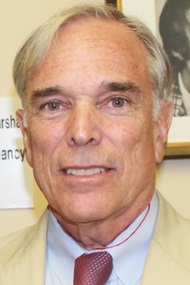COMMISSIONER PROFILES
CURRENT COMMISSIONERS
Chairman Owen P. Eagan
 |
Owen Eagan has always believed in public service. As a resident of West Hartford he has served on various boards and commissions: the town council, the planning and zoning commission, the public safety committee and the ethics commission to name a few. But when he was asked to fill a two-year vacancy on the Connecticut Freedom of Information Commission, Eagan wasn’t sure he was the right fit. “I just wasn’t sure, but I believe very strongly in the importance of public service, so I felt that because I was asked, it was something I wanted to do. I figured it was only for two years,” Eagan said.That was in May of 2009. Now, more than four years later, Eagan is not only still a commission member, he was appointed commission chairman by Governor Dannel Malloy. “It didn’t take me very long to realize not only how important the commission’s work is, but also how much I really enjoyed it,” Eagan said. “What we do really runs the gamut, from a case involving an individual’s right to a case about water rights and the MDC to the First Five Initiative. One of my colleagues said that ‘all roads lead to FOI,’ and I believe she is right.”Eagan is a practicing attorney, a partner in the West Hartford firm of Eagan, Donahue, Van Dyke and Falsey LLP of West Hartford. He is a 1982 graduate of Wesleyan University and a 1985 graduate of Georgetown University Law Center. “I have truly enjoyed my time on the commission. My fellow commissioners and the commission staff have been great to work with and very helpful,” he said.And his feelings about his new leadership role on the commission? “Let me say that I truly feel honored to be asked to serve as chairman. I have no reservations about taking the position. I feel that I have been given great examples to follow in the two chairmen before me, Andy O’Keefe and Norma Riess.”Eagan says that his role as chairman will be to ensure that all parties receive fair and equitable treatment. “It’s important to recognize the importance of open and accessible government,” Eagan said. “But it also is important to have a certain amount of understanding of what it takes for a public agency to comply with some requests. Yes, the slant is to open government, but we have to be fair and act within the confines of the law.” |
Commissioner Lenny Winkler
 |
For Lenny Winkler, it’s always about doing the right thing. Whether as a member of the Groton Board of Education, an emergency room nurse, a state legislator or now as a member of the Freedom of Information Commission, Winkler has let that basic principle be her guide. Not that doing the “right thing” is always easy.As a fairly new legislator in 1991, she voted in favor of the very controversial state income tax. “It was the right thing to do,” she said. “The sales tax was going to go to 12-15%.” But the vote triggered some angry backlash, including the appearance of picketers at her home in Groton. “The thing is most of my constituents told me they were in favor of the tax. Opponents brought in protestors from outside the district and they stood in front of my house shouting ‘Lenny, Lenny you took our last penny,’ ” she remembered. “It was jolting, but I did what I thought was right.”And she has continued down that path ever since. Winkler represented the 41st district in the state house from 1988 to 2006. In her years in the legislature, almost always as a member of the minority party, Winkler took on the insurance lobby on behalf of coastal residents. She championed the creation of a sexual offender registry. She won awards for legislation she helped craft and push through the legislature involving health care, including a 2001 law governing recommendations by school officials for use of psychotropic drugs for children.And now, as a member of the FOI Commission, she is continuing to “do the right thing,” sometimes making decisions that anger other public agencies. “Transparency in government is important,” she said. “It has to be in the forefront for all government agencies and when people believe they have been denied access, they need to have a place to go to get help. What we do here is important.” Winkler sees little difference in her role as a nurse or legislator and her role as an FOI Commissioner. It’s all about helping people at every turn.Her professional career is testimony to that. She graduated from the Norwich Regional Practical Nursing Program in 1976 and worked in the Special Care Nursery at Lawrence and Memorial Hospital for five years, then transferred to the Pequot Health Center emergency room where she worked for 30. She retired from L&M in 2011, then worked in urgent care at the North Stonington Health Center until March, 2012. In the same time period, she began juggling a second career as a public servant. She was a member of the Groton Board of Education when the death of her district’s state representative created an open state house seat. She had joined the board to help further the education of her two daughters and was not registered in any party. But she was asked by the local Republicans to run for the seat. She became a member of the GOP, ran and won…by a whopping 28 votes. She held the seat for 18 years until an unsuccessful bid for the district’s state senate seat in 2010. “I believed in bipartisan legislation,” she said. “I tried to work on coalition budgets. I always worked with the other side of the aisle. The key is relationships with all people.”Her loss in 2010 eventually took her out of the public arena. There was a bid for lieutenant governor on the 2010 ticket with GOP candidate Tom Foley that failed when her 1991 income tax vote was raised by foes (“It was still the right vote,” she said.) But then she received calls from Republicans and Democrats, including Lt. Gov. Nancy Wyman, asking her about a vacancy on the FOI Commission. “It sounded interesting, I had had some exposure to the FOI Commission and the law in the legislature, but frankly, not a great deal,” she said. “I knew it was important work, so I put in the paperwork and the Governor put my name in for the position.”While admitting it was a little strange sitting on the other side of the table during the legislative nominating process, Winkler sailed through with flying colors and became a commissioner in 2013. “I met with Colleen (Murphy, the FOIC’s executive director and general counsel) and she gave a very good introduction into the law and then I read a lot of material to prepare. I also think that sitting on the Judiciary Committee in the legislature gave me good exposure to the handling of legal issues,” she said.Winkler, who has been married to her husband David for 51 years, said she reads all the cases before the commission meets to issues its rulings and tries to prepare for any possibilities. “I really think we do important work,” she said. “We have a really good commission. I do think we should issue more civil penalties on some of these violations. And I also think people who don’t show up for hearings should be penalized too.”Because it’s the right thing to do. |
Commissioner Chris Hankins
 |
When Chris Hankins was tapped to become a member of the Freedom of Information Commission, he was no FOI novice. Unlike some “rookie” commissioners, Hankins brought a wealth of FOI-related experience with him to the commission when he became a member in March of 2013.From December of 1988 to December, 2001, Hankins served the city of Meriden as legal counsel, first as a staff attorney and, for the last seven years of his tenure, as deputy city attorney. In that capacity, he was called on to advise city departments on filling FOI requests for documents, following FOI protocol for meetings and other FOI matters. Occasionally, Hankins would represent the city in front of the commission should a complaint be filed. He even helped develop a model formula for determining indigence as it applies to FOI requests which, he proudly says, many other jurisdictions now use.“I never really looked at (FOI) as something adversarial,” Hankins says of his time in Meriden. “Someone wants something and you give it to them. That was my philosophy if we were dealing with public records.”But then, when he left Meriden to become Legal Counsel for the Connecticut Education Association, he found that some in the public sector didn’t share the philosophy he adopted in Meriden. So he took on another role, that of the complainant, representing the statewide education association before the FOI Commission when it believes it has been improperly denied access to public records or a public meeting.Talk about seeing both sides. Clearly that made the next step an obvious one. “Yes, for sure I had multiple cases at the commission,” he says. “And then to be asked to be a commissioner was a tremendous honor for someone who had been doing FOI work since 1988. Being a commissioner really allows me to see FOI from all sides.”The wealth of FOI experience Hankins now brings to the commission is supplemented by some of his other life experiences. After earning a B.A and an M.B.A from the University of Rhode Island, he earned his law degree from the University of Connecticut in 1984 and worked as both an assistant court clerk and private practice attorney before joining the Meriden legal staff. Hankins also served as a member of several boards in East Haddam where he lives and was an attorney arbitrator for four years from 1997 to 2001. Those experiences, he feels, also prepared him for his role as an FOI Commissioner.“As an arbitrator, I learned how to listen to both sides and from an FOI perspective, having been on both sides of an issue, I think I appreciate the importance of giving both sides a fair shake,” he says. “I think people appreciate that, even if they are unsuccessful. If you are respectful and hear what they have to say, they are satisfied.”Hankins says that he has drawn a “bright red line” when it comes to cases involving matters related to education. He will not hear any cases involving any teachers or school district he might have to deal with as CEA’s legal counsel. He also recuses himself when such a matter comes before the commission for discussion and a vote. Although that might be considered difficult or awkward, Hankins says he must remove himself in the name of fairness.And those recusals haven’t stopped Hankins from becoming a frequent hearing officer in other matters as well as a visible commission member at meetings and other functions. “Like I said, I was honored to be asked to serve and I really enjoy it,” he says. His new role in the FOI universe is, he says, a culmination of where he felt his career had always taken him. “It’s an opportunity to help people and by extension, to make sure that government is open and accessible. It’s good for everyone,” he says. “And I have to say that I have never seen a more dedicated group of public sector employees as I have at the FOI Commission. It’s really a delight to work with them and with my fellow commissioners.” |
Commissioner Matt Streeter
 |
Matt Streeter has always believed in a common sense approach to government. He adopted that philosophy when he began his career in government and public service in 1987 and he carries it with him in his newest role, that of a member of the Freedom of Information Commission.
|
Commissioner Jonathan Einhorn
 |
Long before he became a member of the Freedom of Information Commission, Jonathan Einhorn learned the value of bringing information to the people. Now a prominent New Haven attorney, Einhorn’s first foray into the public arena was as a journalist where he learned firsthand the value of open and accessible government. “It was really a terrific experience,” he says, “It was invaluable. A former editor really helped me learn the value of making sure people are informed. And what I’ve done (since then) has really been an extension of that, bringing information to people and taking people in distress and helping them.”Starting in high school, Einhorn, a New Haven native and graduate of Hillhouse High School, worked as a “fill-in” reporter at the New Haven Register during vacation and holiday periods. He continued in that role through college (Amherst ’70) and law school (UConn ’73) before becoming a member of the Connecticut Bar in 1974. For more than 40 years since then, Einhorn has focused mainly on civil and criminal litigation in his practice. But in addition to his highly successful law practice, Einhorn has repeatedly been drawn back to his interests in the public arena and his desire to see government operating efficiently and openly, first as a New Haven city official and then as an FOI Commissioner.When Rosalind Berman, a future FOI Commissioner, gave up her seat on the New Haven Board of Alderman to make a successful run for the state house of representatives in 1976, Einhorn took over her seat on the Board of Aldermen. He hoped to carry on her legacy of championing open government. There was one not so insignificant problem: he was the only Republican on the board. “Most of the time, I was the only Republican out of 30,” he recalls. “And because of minority representation rules, I had to sit on every committee. But I wanted to take up Roz’s mantra of openness. I wanted to open as many doors in New Haven as I could.”Surprisingly, Einhorn recalls he had some real success working across the aisle with aldermanic Democrats to keep New Haven from operating behind closed doors. He served as an alderman from 1976-1991 and as a Police Commission member from 1984-2003. During that time, there also was an unsuccessful run for mayor of New Haven in 1992. He also was busy helping to raise a family of three and build a law practice that has brought admission to both state and federal courts in Connecticut, the United States Court of Appeals for the Second Circuit and the United States Supreme Court.The call to become a Freedom of Information Commission member came in 2011 after he was nominated by State Senator Len Fasano. He took the oath in November of that year. Having been a public official for more than 25 years and having served as counsel for several towns, including West Haven and East Haven, he knew that decisions in FOI matters were not always obvious. “People go to the FOI Commission because they need help,” he says.Sometimes handling FOI cases “helps me focus more on the watchdog attitude” he embraced while a New Haven city official, he adds. One thing that concerns Einhorn is that “we have a lot of the same people coming before us again and again. I’m concerned that we are dealing with too many frivolous complaints. I did not anticipate such a high volume of those complaints. There should be a mechanism for weeding those out in order to assist those who really need help,” he says.Einhorn says he truly enjoys being an FOI Commissioner. “I like it a lot,” he says. “What has impressed me the most is how nice the staff is and what a tremendous atmosphere there is at the FOIC. I am also very impressed by the legal skills and legal knowledge of the staff.” |
Commissioner Michael C. Daly
 |
Michael Daly is a man of few words. But, like E.F. Hutton, when Mike Daly speaks, people listen.Now in his second term on the Freedom of Information Commission, Daly likes to listen carefully during commission meetings, digest all the evidence, ask questions when he believes he needs more information and speak up only when he believes it’s warranted. When he opines on a matter, it is only after careful deliberation. And people tend to pay attention.“I’ve learned that what we do is very important,” Daly, a commissioner since 2013, said. “Ensuring government transparency is critical.”Daly admits that he had no major interest in the world of government transparency or FOI when approached by former state senator and then Executive Director of the Connecticut Democratic State Central Committee Jonathan Harris about filling a vacancy on the FOI Commission.“I had never had a lot of interaction with the FOI Act,” Daly admitted. But he was asked to come on board and had always wanted “to serve our state in some fashion.” He agreed to become a commissioner and shortly thereafter was appointed by Governor Dannel Malloy and confirmed by the legislature.A practicing attorney, Daly specializes in civil and criminal litigation, real estate development, contract negotiation and probate law. So FOI hadn’t really been on his radar.“I knew of the statute, but serving on the commission has given me a whole new perspective,” he said. Accustomed to long days in court, Daly has found his work at the FOIC “interesting and challenging” in a different manner.“I have truly enjoyed my time on the commission. I’ve been very impressed by the lawyering and by the entire staff,” he said. “It’s a bright, energetic staff and everyone seems very eager to help. The discussions about the case are intellectually stimulating.”Daly is the managing partner at Furey, Donovan, Tracy and Daly, of West Hartford and Bristol. A resident of Farmington, he has been a member of the firm since 1982. A Hartford native, Daly graduated from Northwest Catholic High school in 1975, Trinity College in 1979 and Western New England University School of Law in 1982. Daly has been involved in several local organizations including the Friends of Bushnell Memorial, the Winding Trails Recreational Facility and the Farmington Democratic Town Committee of which has was the vice chairman for six years.While he has enjoyed his time on the FOIC, he has some concerns about how some citizens are utilizing the law.“I fear we’ve gotten away to some extent from the original intent of this law. A tremendous amount of cost and effort is going into these complaints,” he said. Daly indicated he was disturbed by the repetitious nature and volume of complaints from some individuals.Daly is looking forward to working with staff and fellow commissioners in the coming years.“I have to say it again. Everyone has been really great to work with. The collegiality among commissioners and the respect that everyone has for each other is really special,” he said.
|
Commissioner Jay A. Shaw
Commissioner Ryan P. Barry
 |
Attorney Ryan P. Barry has been a member of the Freedom of Information Commission since 2013, appointed to the Commission by the Speaker of Connecticut’s House of Representatives. Ryan is the managing partner of the law firm of Ryan, Barall and Spinella, and is a graduate of the University of Connecticut and the University of Connecticut School of Law. From 2003 to 2011, Ryan served as the state representative for the 12th Assembly District representing Manchester.. |
Commissioner Sean McElligott
 |
Sean McElligott was first appointed to the Freedom of Information Commission in 2011 by the Speaker of the House of Representatives, and served on the Commission until 2013. He was appointed to a second term on the Commission in 2016 by Governor Dannel Malloy. Sean is an attorney with the law firm of Koskoff, Koskoff & Bieder, and earned degrees from Trinity College and Yale Law School. |

